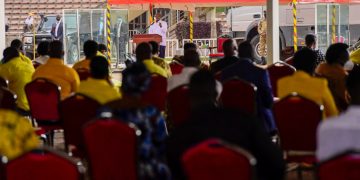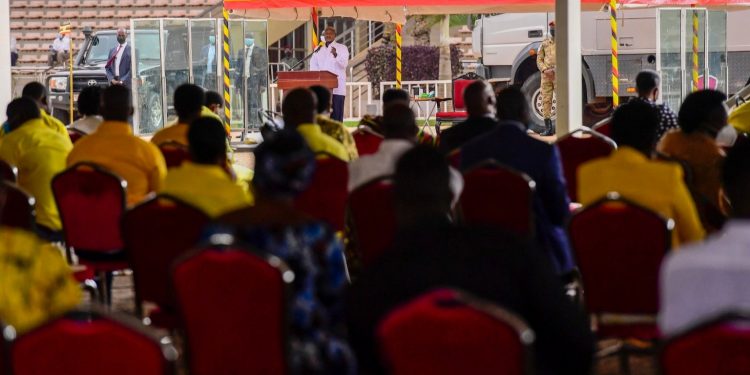President Yoweri Kaguta Museveni has today Tuesday, met with Members of Parliament subscribing to the National Resistance Movement (NRM) to discuss national issues and amendments on the law on bail.
“Today the NRM Parliamentary Caucus is sitting to discuss with H.E @KagutaMuseveni issues of national importance especially security and granting of bail to suspects of capital offences. We hope to make resolutions that will make our country secure,” The Government Chief Whip Thomas Tayebwa said on Tuesday.
The NRM Parliamentary Caucus Secretary General, Lilian Aber, without divulging details also confirmed that the meeting scheduled to be addressed by the President will take place this morning at Kololo Independence grounds, starting at 10:00am.
The president On Wednesday last week while speaking at the swearing in of new judges at State House Entebbe, insisted that bail is not a constitutional right.
“For somebody to kill a person and you give them bail is provocation,” the president said. “It is abominable. I would like us to cure this ideological disagreement. This bail, what is the hurry? Who are you trying to please?,”
Museveni said he would summon the NRM caucus in parliament to see how to go about the issue of granting bail to capital offenders.
“Who said bail is a right? It is not in the Constitution. We are going to work on this. I am going to summon the NRM caucus and if necessary, we put it to a referendum. With this provocation, people will take the law into their hands,” Museveni said.
However, the Chief Justice Alphonse Owiny-Dollo said the issue of granting bail to persons accused of capital offences pending determination of their cases is a constitutional right which is supposed to be either granted or denied upon the discretion of the presiding judicial officer who should also exercise that discretion judiciously
Owiny-Dollo made the remarks during the 4th Annual Memorial Lecture for the slain former Chief Justice Benedicto Kiwanuka held at the Judiciary headquarters in KamPala under the theme, “Administration of Justice in Uganda through the years”.
He said a judicial officer cannot wake up from the good or wrong side of the bed and decide whether to grant or deny bail to an accused person, because it’s a constitutional right the officer has to grant upon considering a number of circumstances.
The right to bail is a fundamental right guaranteed by Article 23 (6) of the 1995 Constitution of the Republic of Uganda.
The constitution says that where a person is arrested in respect of a criminal offence, they are entitled to apply to the court to be released on bail and the court may grant that person bail on such conditions as the court considers reasonable.
It also says that in the case of an offence which is triable by the High Court as well as by a subordinate court, the person shall be released on bail on such conditions as the court considers reasonable, if that person has been remanded in custody in respect of the offence before trial for 120 days .
The Constitution adds that in the case of an offence triable only by the High Court the person shall be released on bail on such conditions as the Court considers reasonable, if the person has been remanded in custody for three hundred and sixty days before the case is committed to the High Court.
Article 28 of the same Constitution states that an accused person is to be presumed innocent until he/she is proved or he/she pleads guilty.









